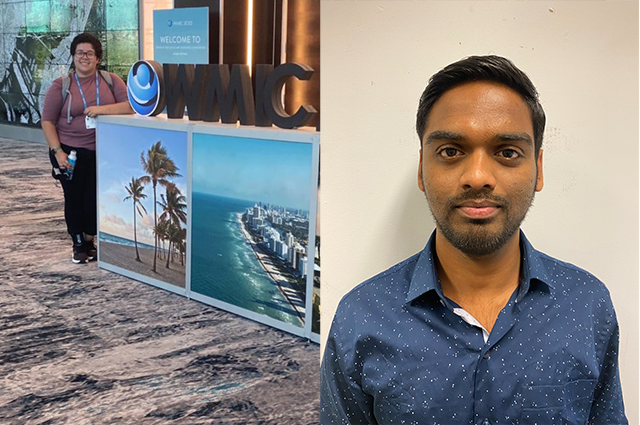Presenting biomedical research

The Tufts School of Engineering is at the forefront of research in several areas of study, with students and faculty members regularly attending conferences to present their research and network. Travel awards help students to attend conferences where they can learn about the latest developments in their field. Two Tufts students from the Integrated Biofunctional and Therapeutics (iBIT) lab in the Department of Biomedical Engineering recently won awards that recognized and furthered their scholarship, allowing them to attend conferences and present their research.
Skye Edwards, a 2nd year PhD student in the Department of Biomedical Engineering, won two travel awards that helped her to attend the World Molecular Imaging Conference (WMIC) – one from the National Institutes of Health, and the other from Tufts School of Engineering. The Tufts Graduate Student Conference Reimbursement Fund is a highly competitive, merit-based award that provides funds to defray the costs associated with presenting research, or to attend conferences and meetings where new research in their field is presented.
While at the conference, Edwards presented her work titled, “Deciphering the effects of placental calcification, vasculature, and oxygenation on fetal growth with multi-parametric ultrasound and photoacoustic imaging.” She was also honored with the Women in Molecular Imaging Scholar Award from the World Molecular Imaging Congress (WMIC), which is awarded to WMIC members who present exemplary papers at the annual meeting. WMIC brings together industry professionals to showcase innovations in molecular imaging.
Marvin Xavierselvan, a fourth year PhD student in the Department of Biomedical Engineering, won the American Society of Photobiology’s (ASP) Urbach Travel award, which assists ASP associate members with travel expenses to present their work as first authors at an ASP meeting. Xavierselvan presented his work on the use of liquid metal nanoparticles for imaging and phototherapy. This work was done in collaboration with Dr. Michelle Foster's group at University of Masschusetts Boston and is published in ACS Applied nanomaterials.
Xavierselvan’s abstract on “Photodynamic therapy of hypoxic head and neck tumors with oxygenated photoacoustic nanodroplets” published in journal Photoacoustics was selected as invited talk in the "From Predictions to Practice: Approaches to PDT Delivery” session at the ASP conference. The American Society of Photobiology promotes research and education in photobiology, which is the study of the effects of light on living organisms.
The iBIT lab, led by Principal Investigator Srivalleesha (Valli) Mallidi, is focused on utilizing non-invasive acoustic and optical imaging techniques with nanomaterials and biological models to understand the structural, functional, molecular, and biomechanical heterogeneity of pathologies such as cancer. Facilitated by travel awards, Edwards and Xavierselvan had the opportunity to share their cutting-edge work in molecular imaging and photobiology with the wider community.
Department:
Biomedical Engineering